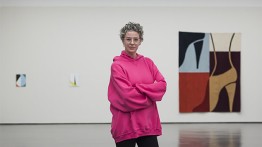Artist Lecture with Ulrike Müller
Thursday, December 5, 2019, 6:30 - 8pm

The School of Art is pleased to present an artist lecture by Ulrike Müller, Alex Katz Chair in Painting (Fall ’19). It will be held in Room 215F of The Foundation Building and is open to the public.
Ulrike Müller’s paintings and drawings complicate conventional expectations and destabilize concepts such as originality, autonomy, and authorship. Müller shifts her formal vocabulary between material and affective states and makes use of a variety of materials and techniques. Alongside small-scale paintings in vitreous enamel on steel, she also produces expansive wall paintings, publications, prints, and textiles.
Ulrike Müller was a co-editor of the queer feminist journal LTTR and organized Herstory Inventory. 100 Feminist Drawings by 100 Artists. Recent solo exhibitions include Mumok (Vienna, 2015) and Kunstverein für die Rheinlande und Westfahlen (Düsseldorf, 2018). At Mumok, Müller, with Manuela Ammer, co-curated the collection exhibition Always, Always, Others. Non-Classical Forays into Modernism (2015). Her work was included in the 2017 Whitney Biennial and in the 57th Carnegie International (2018). It is currently on view in the 58th international art exhibition of the Biennale di Venezia.
Located at 7 East 7th Street, between Third and Fourth Avenues




